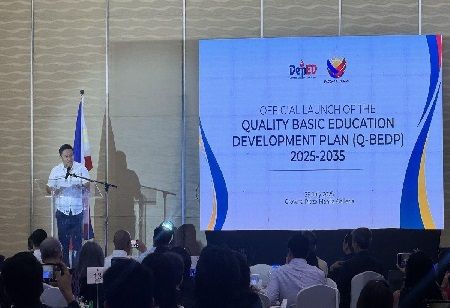- DepEd launches QBEDP 2025-2035, a 10-year reform roadmap focused on decentralization, digitalization, and public-private partnerships to uplift learning outcomes.
- The plan targets five key pillars: teachers, learners, governance, learning quality, and employability, supported by localized decision-making and transparency via Project BUKAS.
- Initiatives include enhanced K-10 curriculum, improved SHS pilot, ARAL remediation rollout, 40,000 new classrooms, and nationwide digital access for teachers and schools.
The Department of Education (DepEd) on Tuesday officially launched the Quality Basic Education Development Plan (QBEDP) 2025-2035, a 10-year plan to revamp the Philippine education system. The thrust for the three big engines of reform is decentralization, intensified public-private partnerships, and digitalization, all to enhance learning outcomes and prepare Filipino learners better for the future.
Education Secretary Sonny Angara, during the launch, reiterated that the plan was developed based on the wisdom of teachers, students, and education leaders so that it is a national and long-term plan. Admitting that there are ongoing problems like inefficient curricula, teacher overburden, infra gaps, and low student performance, Angara said the system needs reforming rather than patches. The QBEDP lists five main reform pillars: teachers, learners, governance, learning quality, and employability, all underpinned by decentralization and accountability.
At the heart of the plan is the transfer of decision-making authority from national to school and local education units. Angara emphasized that school administrators and local DepEd divisions need to be given authority to make quick, data-based decisions. DepEd will release 22 key datasets under Project BUKAS to enhance transparency and aid local decision-making.
Also Read: Thailand Strengthens Regulations on Short-Term Study Programs for Foreign Nationals
The roadmap also aggressively advocates for public-private partnerships to deal with pressing requirements like the building of 40,000 new classrooms, the provision of laptops to all public school teachers, and the nationwide enhancement of internet access. Angara pointed out that partnerships are now mission-oriented and aligned with the larger goals of access and quality.
To support learning gaps, the DepEd is implementing a enhanced K-10 curriculum and piloting an improved senior high school program in 900 schools. The ARAL remediation program, initially launched in Marikina City, will be rolled out nationally to support struggling learners. More than 170,000 SHS learners already received free TESDA NC II certifications, and new Civil Service Commission regulations now qualify SHS and some junior high graduates to sit for government positions.
Digitalization, the third of the key areas for reform, seeks to connect and make all public schools adaptive to the needs of learners. Angara wrapped up by declaring the plan as a joint commitment and promised that this time, the education 'train' will not leave behind students and educators.

